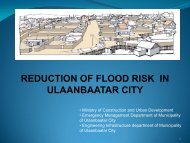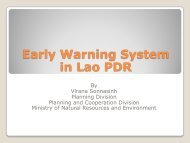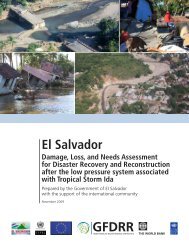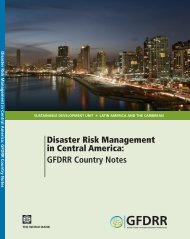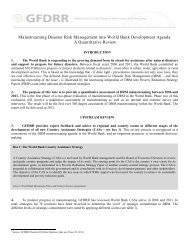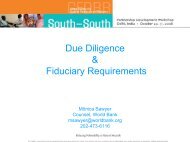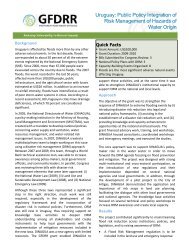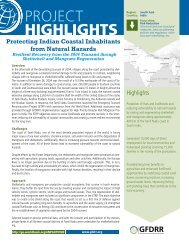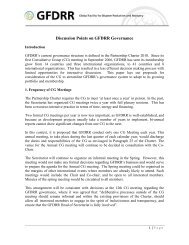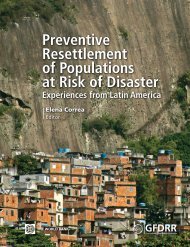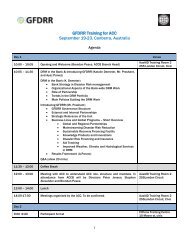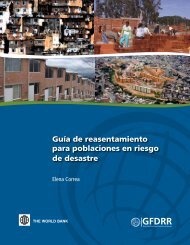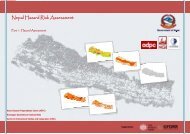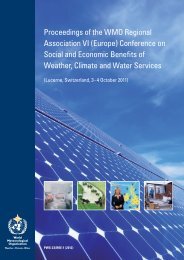Rapid Assessment for Resilient Recovery and ... - GFDRR
Rapid Assessment for Resilient Recovery and ... - GFDRR
Rapid Assessment for Resilient Recovery and ... - GFDRR
Create successful ePaper yourself
Turn your PDF publications into a flip-book with our unique Google optimized e-Paper software.
Regulatory Control of Water Resources<br />
Surface water. The utilization of surface runoff water is regulated by Section 1339<br />
of the Civil <strong>and</strong> Commercial Code. This section recognizes a natural principle that<br />
water always flows to a lower place <strong>and</strong> that a l<strong>and</strong>owner must accept the natural<br />
flow of water across the l<strong>and</strong>. The provision also entitles a l<strong>and</strong>owner to retain<br />
surface runoff to meet the needs of farm production <strong>and</strong> livelihood needs <strong>and</strong> the<br />
surplus water must be allowed to flow naturally. The Code also recognizes the right<br />
of the l<strong>and</strong>holder to retain water in a well or pond <strong>and</strong> to prohibit access of other<br />
persons to this water source.<br />
Irrigation water. The use <strong>and</strong> management of water in irrigation canals is tightly<br />
controlled by the Royal Irrigation Act, 1942, which is intended to govern the<br />
construction, operation <strong>and</strong> maintenance of irrigation projects undertaken by RID.<br />
Several Acts deal with the protection of waterways. These Acts generally prohibit<br />
the dumping of rubbish <strong>and</strong> other materials, toxic water <strong>and</strong> toxic chemicals into<br />
waterways <strong>and</strong> establish fines <strong>and</strong> imprisonment <strong>for</strong> offenders. Most of these Acts<br />
are now very old <strong>and</strong> the fines <strong>and</strong> punishment <strong>and</strong> the scope <strong>and</strong> nature of<br />
pollution covered are no longer in keeping with modern conditions <strong>and</strong><br />
circumstances.<br />
Groundwater. The Department of Groundwater Resources (DGR) regulates groundwater<br />
usage through the issue of permits <strong>for</strong> water well drilling. The DGR is responsible<br />
<strong>for</strong> reviewing water well drilling requests <strong>and</strong> issue water well permits within the<br />
Bangkok Metropolitan area. The DGR also takes the responsibility <strong>for</strong> collecting the<br />
groundwater fee payment from private sector users in accordance with the reading<br />
from water well meters attached to the permitted wells.<br />
Since over-exploitation of groundwater became the major cause of l<strong>and</strong> subsidence<br />
<strong>and</strong> deterioration of groundwater quality in the area of Bangkok, the cabinet regulated<br />
a groundwater <strong>and</strong> l<strong>and</strong> subsidence preventive <strong>and</strong> mitigation measure <strong>for</strong> the area<br />
in 1983. The main aim of this measure is to set critical groundwater zones, of which<br />
three are identified according to the degree of l<strong>and</strong> subsidence. L<strong>and</strong> subsidence<br />
also has a direct effect on increased flooding in local areas where there has been<br />
heavy groundwater withdrawal. The precise definition of sustainable groundwater<br />
abstraction rates <strong>and</strong> the regulatory control of sustainable groundwater abstraction<br />
levels is critical in avoiding any further l<strong>and</strong> subsidence.<br />
International Experience with Water Resources Management<br />
Principles <strong>and</strong> Practices<br />
In recent years the key principles <strong>and</strong> practices of good integrated water resource<br />
management have achieved international consensus. These principles are based on<br />
the - often poorly appreciated - fact that water is a finite resource, essential <strong>for</strong> life,<br />
yet vulnerable to degradation.<br />
In developing <strong>and</strong> developed countries where good IWRM is practiced, there are four<br />
features that constitute best practice:<br />
1. An institutional framework is developed which is both robust <strong>and</strong> flexible,<br />
<strong>and</strong> includes modern legislation <strong>and</strong> an integrated policy framework.<br />
2. Planning <strong>and</strong> management is knowledge-driven. Strategic assessment of<br />
water <strong>and</strong> related resources receives high priority, <strong>and</strong> does not stop at<br />
mere data management, but actively pursues the generation of strategically<br />
focused in<strong>for</strong>mation <strong>and</strong> knowledge.<br />
A-44 THAI FLOOD 2011 RAPID ASSESSMENT FOR RESILIENT RECOVERY AND RECONSTRUCTION PLANNING



